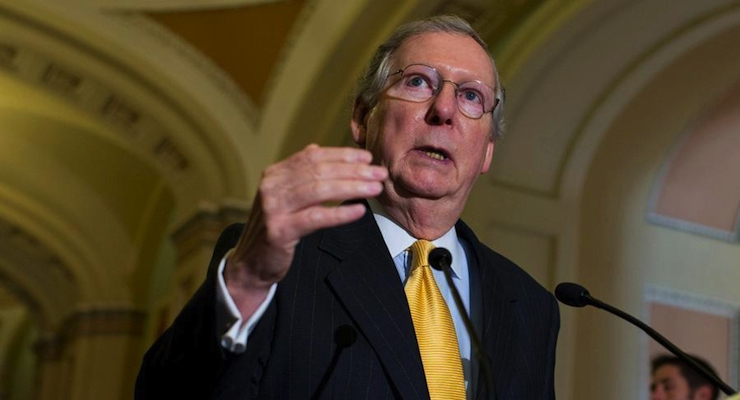

Senate Majority Leader Mitch McConnell, R-Kty., speaks to the press in the halls of the Senate. (PHOTO: AP)
President Barack Obama gave a televised address after the sudden death of Justice Antonin Scalia and said he will nominate a replacement “in due time.” Scalia, the longest-serving justice on the court and arguably most important conservative voice, died this weekend in rural Texas at 79.
“The American people should have a voice in the selection of their next Supreme Court Justice,” Senate Majority Leader Mitch McConnell, R-Kty., said in a statement. “Therefore, this vacancy should not be filled until we have a new President.”
The statement set off a firestorm among Senate Democrats, who have been citing modern history and constitutional law to make their case. Unfortunately, facts and fictions are permeating media reports, as well as statements from both Democrats and Republicans, and need to be separated. Sen. Elizabeth Warren, D-Mass., like McConnell, was putting in her two cents before the news even had a chance to settle in.
.@SenateMajLdr is right that Americans should have a voice in selecting the next SCOTUS justice. In fact, they did: when @POTUS won in 2012.
— Elizabeth Warren (@SenWarren) February 14, 2016
Warren added that Scalia’s death created an “immediate vacancy on the most important court” that needed to be filled by President Obama and approved by the U.S. Senate, and that Obama’s reelection was an affirmation of his mandate. That’s not how it works, or at least, supposed to work.
Article. II, Section 2 of the U.S. Constitution–pertaining to the president’s appointment power–reads in full as follows:
He [The President] shall have Power, by and with the Advice and Consent of the Senate, to make Treaties, provided two thirds of the Senators present concur; and he shall nominate, and by and with the Advice and Consent of the Senate, shall appoint Ambassadors, other public Ministers and Consuls, Judges of the supreme Court, and all other Officers of the United States, whose Appointments are not herein otherwise provided for, and which shall be established by Law: but the Congress may by Law vest the Appointment of such inferior Officers, as they think proper, in the President alone, in the Courts of Law, or in the Heads of Departments.
The phrase by and with the Advice and Consent of the Senate is not for show, it was intentional. While it is true that President Obama was reelected in 2012, it is also true that the American people gave control of the U.S. Senate to his political opposition in 2014 precisely to place a check on him (low turnout is a false argument). In modern American politics, the status quo powers on both sides of the aisle have paid lip service and put on a charade to reflect these words. But, for the most part, even Republicans haven’t used their power to influence the court.
For instance, President Obama nominated and, with the help of Republicans, the Senate approved an openly gay, former ObamaCare defender (Elena Kagan) even as major cases regarding the health care law and same-sex marriage were making their way to the high court. As pivotal cases on affirmative action and abortion made their way to the court, those same Republicans approved Sonia Sotomayor, who in the past made her liberal views known on both issues.
So, when Politico attacks McConnell for being “a self-appointing guardian of Senate tradition,” it’s not exactly fair. McConnell, whom we will deal with shortly, has in fact restored long-held chamber rules that were abolished under Majority Leader Harry Reid, D-Nev, in order to ram an unpopular liberal agenda through Congress.
But is it tradition to give a lame-duck president a vote on a justice? Sen. Ted Cruz, R-Texas, vowed in South Carolina to filibuster any liberal nominee put forward by the president. Sen. Chuck Schumer, D-N.Y., said on Sunday in response that denying a vote would be more obstructionism, and challenged Cruz to show him where in the Constitution he has such authority. However, in 2007, Schumer said and did the same exact thing.
In reality, the longest vacancy on the Supreme Court was 27 months and, despite what a report by NPR claimed, the nomination and confirmation of Anthony Kennedy under President Ronald Reagan in 1988 isn’t comparable, at all. Reagan made two prior nominations–one of which didn’t even make it through the committee–that the Democratic Congress drew out and ultimately rejected. Thus, Kennedy, the court’s only true swing vote, was a compromise, not a conservative.
Sen. Chuck Grassley, R-Iowa, was largely correct when he said in a statement that no one in 80 years has been confirmed in a presidential year. The “Thurmond Rule,” which is more tradition than a rule, does give the ruling party an option to “delay, delay, delay” when a high-stakes judicial nomination runs into a presidential election.
Nevertheless, Kennedy eventually got a vote and, while McConnell’s immediate declaration that there would be no vote on a nominee isn’t exactly unprecedented, as Democrats claim, it also isn’t the codified law. The bottom line is that President Obama has the right and power to nominate a replacement for Justice Scalia, but he doesn’t have the right to get that nominee on the court. It’s ultimately within McConnell’s and the Senate’s power to reject whomever he nominates.
In fact, the media and most politicians seem to not understand that James Madison wanted consensus to be hard. The Madisonian Republic defined in the Constitution, which Justice Antonin Scalia dedicated his entire life to preserve, is supposed to slow down the wheels of the federal government from turning.
It is said in D.C. that Scalia, himself, wanted the president to nominate his replacement, something a White House aide was quick to point out. That’s the system of government Justice Scalia loved so much.
However, he didn’t say the Republican-controlled Senate had to confirm said nominee in the event they didn’t share his believes.








T.W. Williams / February 15, 2016
/
People's Pundit Daily / February 15, 2016
Believe us, T.W., we’re looking into this now
/